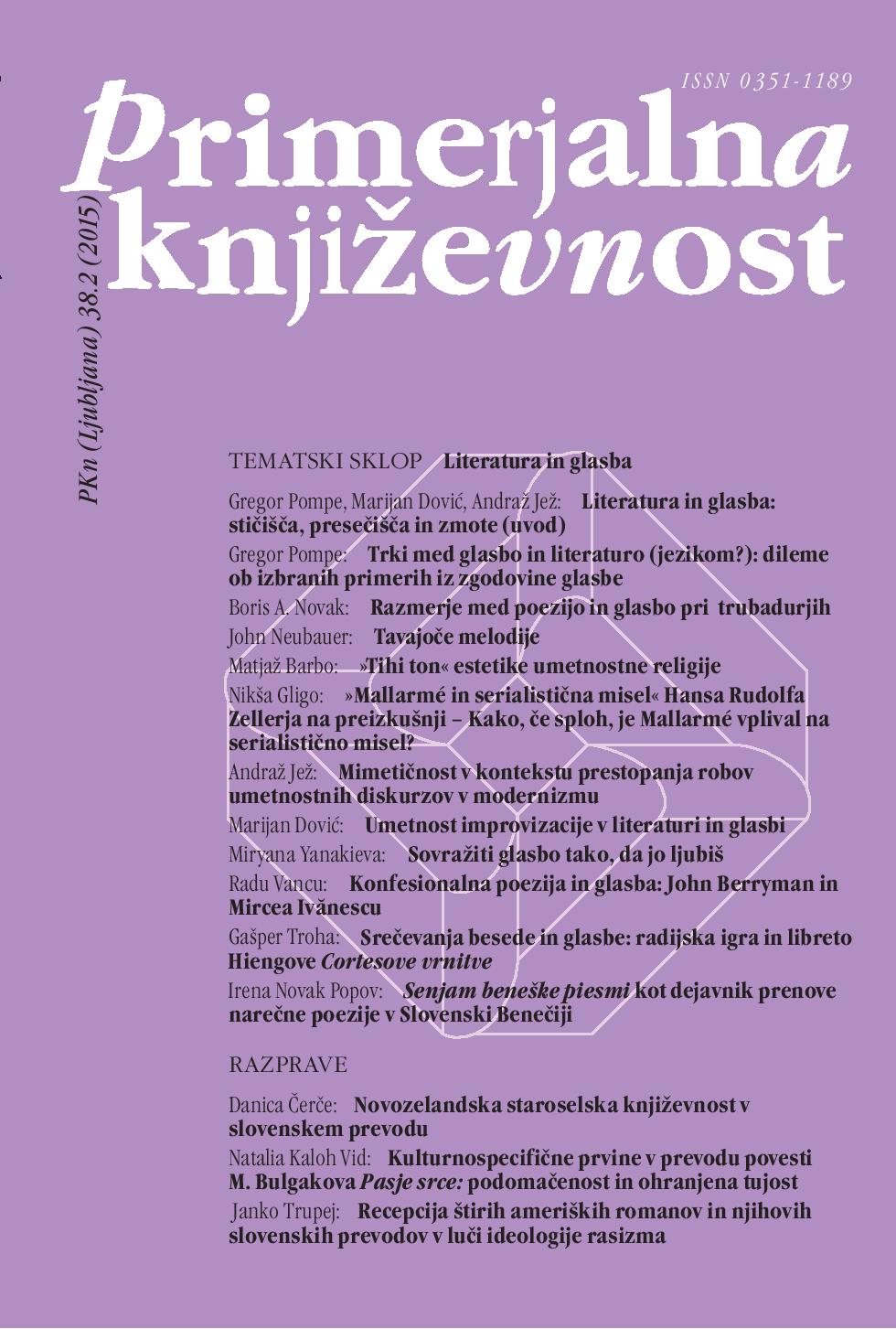Translation of Culturally Specific Items in M. Bulgakov’s Dog’s Heart: Domestication or Preserving Foreignness?
Keywords:
Russian literature, Bulgakov, Mikhail, Dog’s Heart, literary translation, Slovenian translations, translation strategies, domestification, foreignizationAbstract
One of the primary questions of the translation studies since the ancient times has been whether the translator should domesticate the original work, bringing it closer to the target culture or to remain faithful to the “spirit“ of the source discourse and to retain as many foreign elements in the translation as possible. The analysis focuses on the only Slovene translations of Mihail Bulgakov‘s novel Dog’s Heart, in which the author depicts the historical and cultural discourse of the early Soviet epoch of 1920s–1930s by introducing numerous culturally specific elements (e.g., food and clothes items, geographical names, political slogans, etc.) The translation made in 1976 by Drago Bajt is analyzed from the perspective of translating culturally specific items, with a special emphasis on the use of domesticating and foreignizing translation strategies. The analysis traces the translation’s adequacy, illustrating that when translating culturally specific items, Bajt skilfully balanced between domesticating and foreignizing the context. Though the translation is fluent and transparent, Bajt often kept the elements important for adequately transference of the cultural contexts. Hence, the foreign cultural context is recognizable as a number of essential source references, including personal names, abbreviations and clippings, as well as allusions to historical events were transferred into translation without adapting them to the norm of the target language. The three primary translation strategies Bajt used are (a) literal translation with/without intra-textual explanation;(b) translation with a hypernym; (c) substitution with a familiar term. In several cases transliteration was also used. A successful combination of these approaches enabled the translator to keep a foreign spirit without confusing the target readers, as the meaning of unknown cultural items is always clear from the context.References
Bulgakov, Mihail. Sobačje serce. Sobranije sočinenij v pjati tomah. T. 2. Moskva: Hudožestvennaja literatura, 1989.
Brnčič, Vera. »Predgovor.« Bulgakov, Mihail. Mojster in Margareta. Prev. Janez Gradišnik. 2. natis. Ljubljana: Cankarjeva založba, 1987.
Bulgakov, Mihail. Pasje srce. Prev. Drago Bajt. Ljubljana: Mladinska knjiga, 1976.
Grosman, Meta. »Književni prevod kot oblika medkulturnega posredovanja leposlovja.« Ur. Meta Grosman, Uroš Mozetič. Književni prevod. Ljubljana: Znanstveni inštitut Filozofske fakultete, 1997. 11–56.
– – –. Književnost v medkulturnem položaju. Ljubljana: Znanstveni inštitut Filozofske fakultete, 2004.
Even-Zohar, Itamar. »The Position of Translated Literature Within the Literary Polysystem.« Poetics Today 11.1 (1990): 45–51.
Javornik, Miha. »M. A. Bulgakov – umetnost in zgodovina, fiktivno ali realno.« Slavistična revija 40.1 (1992): 79–101.
Makhota, Tina. »Problem kulturnospecifične obarvanosti besedila pri prevajanju romana Paddy Clarke Ha Ha Ha.« Književni prevod. Ur. Meta Grosman, Uroš Mozetič. Ljubljana: Znanstveni inštitut Filozofske fakultete, 1997. 89–99.
Mozetič, Uroš. »Problemi prevajanja angleških in ameriških leposlovnih besedil.« Književni prevod. Ur. Meta Grosman, Uroš Mozetič. Ljubljana: Znanstveni inštitut Filozofske fakultete, 1997. 57–75.
Ožbot, Martina. Prevodne zgodbe. Poskusi z zgodovino in teorijo prevajanja s posebnim ozirom na slovensko-italijanske odnose. Ljubljana: Založba ZRC, 2012.
Skaza, Aleksander. »Pripovedništvo in dramatika Mihaila Bulgakova.« Mihail Bulgakov. Škrlatni otok. Molière. Ljubljana: Mladinska knjiga, 1981.
Verč, Ivan. Razumevanje jezikov književnosti. Ljubljana: Založba ZRC, 2010.
Vevar, Štefan. Vrvohodska umetnost prevajanja. Ljubljana: Cankarjeva založba, 2013.
Kocijančič Pokorn, Nike. »Teoretične osnove za kritično vrednotenje prevoda. Kriteriji literarnega prevajanja.« Kriteriji literarnega prevajanja. Prevajanje in terminologija. 21. prevajalski zbornik. Ur. Majda Stanovnik. Ljubljana: Društvo slovenskih književnih prevajalcev, 1997.
Vidrih, Nives. »Zastaranje prevoda – primer Haškovega Švejka.« Prevod besedila. Prevajanje romana. 20. prevajalski zbornik. Ur. Majda Stanovnik. Ljubljana: Društvo slovenskih književnih prevajalcev, 1996. 73–77.


